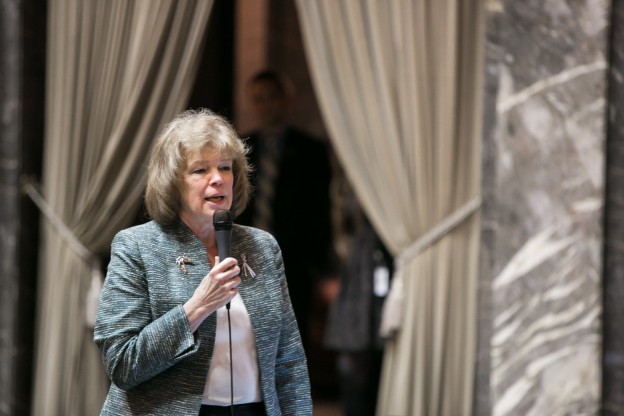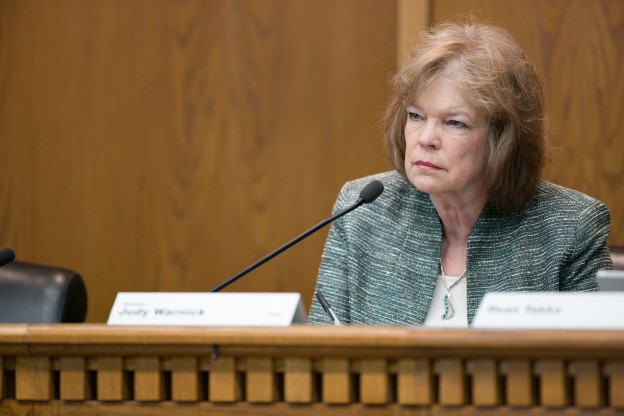Greetings Friends and Neighbors,
With just a few weeks left in the 2016 legislative session, our Senate majority continues to build on the results we achieved in 2015 while pushing for increased transparency and accountability in state government. I have been fortunate to have several of my priority bills approved by the state Senate; they are now working their way through the House of Representatives. As chair of the Senate Agriculture, Water and Rural Economic Development committee I continue to advocate for common-sense reforms to how our state engages with farmers and other agricultural producers, as well as seek bipartisan solutions to water issues around our state.
Increasing access to water
Getting agreement on water issues is challenging. This year, fortunately, one of my bills to improve access to water rights cleared the Senate with near-unanimous approval. Senate Bill 6513 comes in response to the state Department of Ecology’s notification to Chelan County that permits would not be issued. The legislation would direct Ecology to act on water-rights applications in the Wenatchee and Elwha-Dungeness river basins.

Expanding benefits for first responders
The Senate has approved my legislation to expand retirement and disability benefits to first responders injured or killed while responding to natural disasters or other federal emergencies. Senate Bill 6263, approved unanimously, would allow members of the Law Enforcement Officers and Fire Fighters Retirement System (LEOFF 2) pension plan to receive unreduced retirement benefits for injuries that are currently considered duty related.
|
Protecting crops from pests and disease
Agriculture is extremely important in our district and state. Last year, the value of Washington’s apple crop alone was $3.7 billion, with total economic value to the state being $8 billion. It is critical to protect our producers whose efforts drive our state’s economy. To that end, legislation that I introduced was approved by the Senate to prevent the spread of invasive species, pests and disease through compost.
Senate Bill 6605 would create a process for the state Department of Agriculture to review applications for moving waste for composting from facilities in quarantine areas to areas not under quarantine. The goal is to review information to ensure that facilities are not at risk of spreading plant pathogens, disease or pests.
Click here to read more. 
Voters’ voices silenced by minority Democrats on 2/3rds tax-vote amendment
Last week I voted to let Washingtonians have the final word on requiring approval from a two-thirds majority in the Legislature to raise taxes. Senate Joint Resolution 8211, which would let voters amend the state constitution to include the popular two-thirds tax-vote threshold, failed to receive support from the Senate’s minority Democrats and therefore fell short of the 33 votes it needed to move to the House of Representatives (constitutional amendments require a higher level of approval, and tax increases should too).
The voters in Washington have said six times over two decades that it should be harder for the state to raise taxes. Their voices should be heard. The solution to our state’s challenges is not taking more and more of the people’s money. Our Senate majority has demonstrated that we can make issues like education a priority without raising taxes. Minority Democrats in the Senate made every excuse as to why they didn’t trust the people of Washington to have a voice, and I think they are wrong.
Click here to read more.
It is an honor to serve as your state Senator. Please don’t hesitate to contact me with questions regarding state government.
Sincerely,

Judy Warnick,
13th District Senator
Share my E-newsletter
Do you know others who live in our district who may not be receiving my e-news updates? Please feel free to forward this e-mail invitation to them or click on the share button below. If you have received this without directly subscribing, please visit my website by clicking here and sign up to receive my e-newsletters!
[[SHARE_THIS]]
Contact Me
Olympia Office:
103 Irv Newhouse Bldg.
P.O. Box 40410
Olympia, WA 98504
Olympia Phone:
360.786.7624
E-mail:
Judith.Warnick@leg.wa.gov
Website:
Click here to visit my website.
|





















